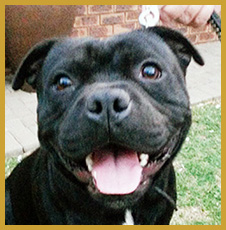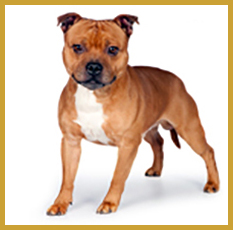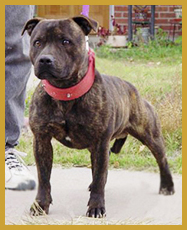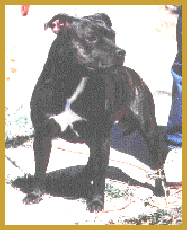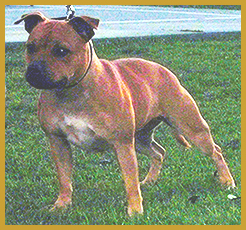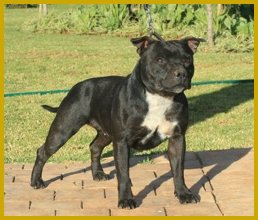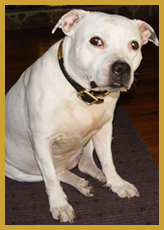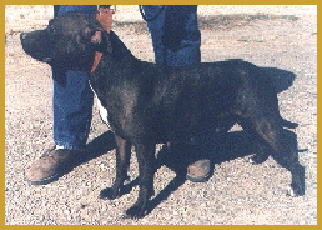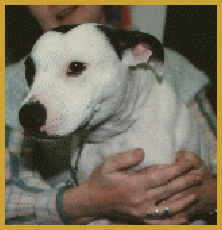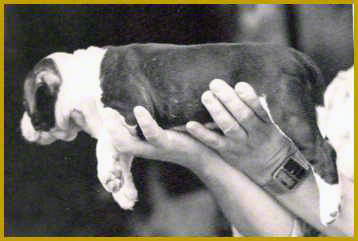So you want to get a Stafford?
So you want to get a Stafford? That in itself is not a tall order as there are a number of places you can start your search and likely end up with a fair representation of the breed. To begin your search you must first realize that purebred does not equal well bred in many cases and this stands true for Staffords.
You have to ask yourself whether you want a male or female, young puppy, middle age puppy or adult dog. You have to look at your long term goals for the dog prior to obtaining this family addition. If you already have the conformation show bug you should opt for an adult. If you buy a 8 -12 week old puppy hoping that your $600.00-$2,000.00 price equates to show quality you are apt to be sadly mistaken which in turn will cause you to take umbrage with the breeder, which you should. Any breeder who tells you that a young pup, especially a bull and terrier, will eventually be show quality is a bald faced liar or an optimist of the highest order. There is no way to predict just how close to the written standard a young bull and terrier will compare before it is much younger than one year old. All a breeder can do is guess as to the quality of the pup, some better than others grant you, and point out any disqualifying points like the wrong color, three legs instead of four, blind in one eye, etc.
The very first thing you must decide before paying what most would consider a fairly high price for a Stafford pup is what do you want to do with your Stafford. Will it be a great show dog? Probably not. One can hope, but you must decide before the purchase that this dog will be a pet first and foremost and if you are lucky it may turn out to be a show dog. The funny thing about pet dogs is that they can do many things just as well as a show dog such as fly ball, agility, obedience, tracking, earth dog trials, hunting, therapy work, alarm/protection and just being a good pal. It is likely that if you view your Stafford pup as first and foremost a pet then both of you will likely experience less stress and develop a much healthier dog to human relationship.
Where can you go to find a Stafford puppy? The newspaper classified section should probably be your last resort, but don't count it out entirely, but stranger things have happened in the world of dogs than finding a good purebred in the classifieds. Classified sections of purebred all breed magazines catering to the general public might be a place to start.
There are a number of such magazines published around the globe but in most cases the Stafford is not widely represented in these ads. I can attest to at least one first rate breeder who advertises this way, in part because of his remote location and the fact he can get wider dissemination to the interested public than having to rely on the much narrower market of referrals from possible moribund or uncomplimentary peers.
The INTERNET has become quite a source for locating and having direct contact with breeders. There not only is detailed discussions on the breed but this also gives you quick access to a wide variety of breeders from around the globe. The proliferation of air transport has made international shipping of Staffords quite routine, although most breeders and airlines have minimum ages and specific seasons based on ambient temperatures dictating when they will ship. Air transport for a pup obtained from another country through the INTERNET will have a dramatic impact on the buyer's decision on what age is best to receive a Stafford.
Conformation shows are another place to start the search for a Stafford. Unfortunately the single biggest mistake that most Stafford puppy hunters make at conformation shows is in assuming that the owner of the dog that got the big win is a good source for a sound healthy pup. It is highly likely that there may not be a truly "good one" at any given show on a given day and this is highly likely in Staffords at all breed shows. In most cases owners of winning show dogs know all the right buzz words and may have many years in the breed, but may not be worth a damn with respect to breeding anything other than a well "marketed" dog. A conformation show, while focusing on purebred dogs, does not necessarily mean that some or even many at the show are well bred dogs.
I would not want to dissuade any experienced or committed dog person from getting a Stafford. But in 20 years of experience with bull and terrier breeders I have found that the vast majority of Stafford breeders have little practical experience with animal husbandry in general and canines specifically. In my experience some of the very worst Staffords on average come from breeders who have produced a large number of pups over a span of many years.
There is an art and science to breeding. There are a very few Stafford breeders who truly understand the science of breeding and they will all attest that they have a clear perception of the art of breeding. When contacting a breeder the first questions to come out of a prospective buyers mouth should be oriented on finding out how long the breeder has been in the breed, what other animals does the breeder have experience with and specifically what other breeds of dog the breeder has bred, owned or worked with. Good answers to these first questions should give the buyer some confidence that the breeder understands animal husbandry in general and probably applies sound breeding principals to their Stafford program.
It is also a good idea to get the breeder's opinion on the practice of spaying, neutering and sometimes euthanizing, a practice among good breeders known as culling. If a breeder does not cull then he or she is not serious about improving their stock or the overall health of the breed. It is only through eliminating the garbage in the breed from the breeding pool that the long term health and stability of a breed can be ensured. A fine looking conformation show dog might be garbage if they are a carrier of a immune deficiency syndrome, juvenile cataracts or other hereditary disorder.
Another key area is genetic screening. Any breeder worth the name will have at least the hips and eyes evaluated for their breeding stock. A very few others will have had their dogs' elbows evaluated, blood screening for various disorders and will have good records.
There are rare occasions when you will encounter a Stafford breeder who either due to a lack of formal education, resources or locale will not be adept at some of the modern scientific techniques used by good breeders. But like the scientific breeder they will likely have good records. It is record keeping that forms the basis of the science of breeding and this record keeping can help the breeder with the "art" of breeding as well.
The following comments are areas that I consider the best way to wade through the morass of technical questions usually advised to ask. These next comments are what I call the least common denominators that can be asked and understood by any puppy seeker or breeder.
The first set of questions are quite simple and straightforward and if any breeder is reluctant to answer to your satisfaction move on. First ask for a list of litters produced or find out how many litters they have produced over the last 20 years. Next ask for a list of puppy buyers for a specific litter from 10 years ago and permission to contact them to find out their level of satisfaction with their Stafford. Also ask for a more recent list of puppy buyers from a specific litter and ask permission to contact them as a reference. Make sure that you have done everything you could to see in person the parents and grand parents of the litter in question. If you can't ask to see photos and videos and ask for the owners' names and addresses of these dogs so that you may contact them.
Evaluating the aforementioned information is simple. If the vast majority of the dogs born 10 years ago are still alive, healthy, long lived and perform the tasks the owner has set down for the dogs, then you have crossed the first and major hurdle. You will want to find out the same information concerning the "newer" litter. Additionally you will want to know the pedigree of the more recent litter reflect the earlier litter in terms of lineage; some of the same grandparents, great-grandparents, etc. If you received positive responses from the owners of the "old" litter and newer litter you should have some degree of comfort in your choice of breeder. Remember to look at as many dogs as the breeder has used in his breeding program.
Finding and acquiring a great Stafford is difficult. Why would anyone want to give up a truly great one? Finding a good Stafford, especially a puppy, is not quite so hard if you use all the resources available to you such as newspaper ads, canine magazine classifieds, INTERNET, dog shows or word of mouth. You will also have to weigh the fair value cost of your Stafford in terms of breeder experience and previous customer satisfaction. Unfortunately there are no purebred dog consumer advocate organizations regardless of what you think the purpose is of canine registries or breed clubs.
In the final analysis you must make the decision, but if you base your decision on the inseparable tenets of health, longevity, functionality and looks based on a breeder's successive generations of success you will likely have good luck in your search for a good Stafford.
Craig Harrington
